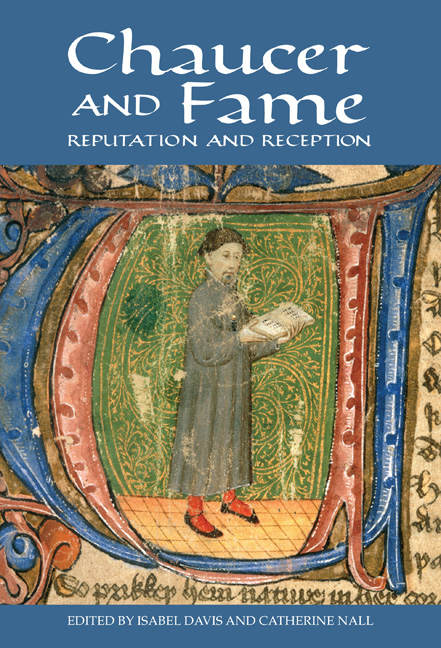Book contents
- Frontmatter
- Contents
- List of Illustrations
- List of Contributors
- Acknowledgements
- Introduction
- 1 Chaucer Joins the Schiera: The House of Fame, Italy and the Determination of Posterity
- 2 ‘I Wolde … han Hadde a Fame’: Dante, Fame and Infamy in Chaucer’s House of Fame
- 3 ‘And kis the Steppes where as thow Seest Pace’: Reconstructing the Spectral Canon in Statius and Chaucer
- 4 ‘I Nolde Sette at al that Noys a Grote’: Repudiating Infamy in Troilus and Criseyde and The House of Fame
- 5 The Early Reception of Chaucer’s The House of Fame
- 6 Fame’s Penitent: Deconstructive Chaucer Among the Lancastrians
- 7 After Deschamps: Chaucer’s French Fame
- 8 ‘Fresch Anamalit Termes’: The Contradictory Celebrity of Chaucer’s Aureation
- 9 Chaucer the Puritan
- 10 Revenant Chaucer: Early Modern Celebrity
- 11 Ancient Chaucer: Temporalities of Fame
- Bibliography
- Index
- Chaucer Studies
10 - Revenant Chaucer: Early Modern Celebrity
Published online by Cambridge University Press: 21 May 2021
- Frontmatter
- Contents
- List of Illustrations
- List of Contributors
- Acknowledgements
- Introduction
- 1 Chaucer Joins the Schiera: The House of Fame, Italy and the Determination of Posterity
- 2 ‘I Wolde … han Hadde a Fame’: Dante, Fame and Infamy in Chaucer’s House of Fame
- 3 ‘And kis the Steppes where as thow Seest Pace’: Reconstructing the Spectral Canon in Statius and Chaucer
- 4 ‘I Nolde Sette at al that Noys a Grote’: Repudiating Infamy in Troilus and Criseyde and The House of Fame
- 5 The Early Reception of Chaucer’s The House of Fame
- 6 Fame’s Penitent: Deconstructive Chaucer Among the Lancastrians
- 7 After Deschamps: Chaucer’s French Fame
- 8 ‘Fresch Anamalit Termes’: The Contradictory Celebrity of Chaucer’s Aureation
- 9 Chaucer the Puritan
- 10 Revenant Chaucer: Early Modern Celebrity
- 11 Ancient Chaucer: Temporalities of Fame
- Bibliography
- Index
- Chaucer Studies
Summary
In his Short History of Celebrity, Fred Inglis makes the claim that celebrity as a concept really only comes into being in the eighteenth century – a product of the invention of the fashion industry, gossip and the new consumerism of the early modern period. He distinguishes celebrity, a selfconsciously modern notion, from earlier forms of spectacle, which he identifies as renown. The difference, he argues, is that renown was accorded to men and women because of their high accomplishments. In his words, it ‘brought honour to the office not the individual, and public recognition was not so much of the man himself as of the significance of his actions for the society’. By contrast, celebrity is a function of the personal fame of the individual. The celebrity lives life in the public eye while maintaining the illusion that this life is private. Public figures, in this formulation, ‘at the centre of such vast attention [are] uniquely recognizable and still sacredly remote’.
This notion of celebrity is interesting and helpful in thinking through the rise of glamour, modern theatrical culture and the twentieth-century political cult of personality, but it is also useful to think back to the origins of celebrity, to a moment when the illusion of presence laid claim to a kind of ‘truth’. In larger terms, the distinction between renown and celebrity is probably not so much historical as epistemic. Shakespeare's plays, for instance (especially the history plays), often rely on the distinction between and the confusion of person and office, private and public. This double-bodiedness, famously adumbrated by Ernst Kantorowicz in his treatment of the corporeal aspects of kingship, suggests that the roots of celebrity lie much further back than Inglis observes. And, indeed, Joseph Roach suggests that it is precisely this idea of a persona that circulates in the absence of the person him-or herself that really defines the idea of celebrity.
If absence, then, defines and even makes possible the idea of celebrity, it is only because there is an invented presence that one can construct. At the same time, this falseness is transformed into something that seems to be true – it is, in other words, something akin to what Plato described as a phantastic presence.
- Type
- Chapter
- Information
- Chaucer and FameReputation and Reception, pp. 185 - 200Publisher: Boydell & BrewerPrint publication year: 2015



